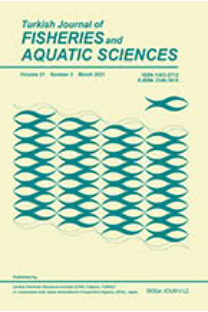The Influence of Changes in Nutrient Ratios on Several Biological Processes in İzmir Inner Bay
The dilution method was employed in İzmir Inner Bay in order to measure the phytoplankton community potential growth rate and grazing rate in May, 2005. At this study, the percentage of primary production consumed via grazing and the significance of grazing in food chain were tried to be emphasized. The dilution technique was studied on the natural sea water enriched with various Si:N and N:P ratios. Nitrogen limitation was observed in Si:N experiment series. The consumed percentage of primary production via grazing increased with the rising Si:N ratio while the grazed percentage of biomass was decreased. The net growth rate of phytoplankton was greater than the grazing rate at a Si:N ratio of 0.34 and 1.31. For greater ratios, grazing rate became higher than the net growth rate. From the data obtained, it was concluded that microplankton is able to keep the size of the algal populations around the steady state. The Si:N ratio in ?zmir Bay is approximately 6 in 18 May 2005. Because of the nitrogen treatment tends to increase this ratio in the sea water, microzooplankton grazing must limit phytoplankton blooms. The changes in Si:N ratios can account for the 83% -98% of the taxon-specific grazing. Prorocentrum gracile, Cylindrotheca closterium and picoplankton were the most abundant species observed constantly both in Si:N ratio and N:P ratio series. The quite small and negative insitu growth rates revealed that nutrient limitation was also of great significance besides grazing on phytoplankton. The N:P ratio of 4 in the environment indicated that Prorocentrum gracile and Cylindrothece closterium would be consumed via grazing and picoplankton would be under pressure by nutrient limitation.
The Influence of Changes in Nutrient Ratios on Several Biological Processes in İzmir Inner Bay
The dilution method was employed in İzmir Inner Bay in order to measure the phytoplankton community potential growth rate and grazing rate in May, 2005. At this study, the percentage of primary production consumed via grazing and the significance of grazing in food chain were tried to be emphasized. The dilution technique was studied on the natural sea water enriched with various Si:N and N:P ratios. Nitrogen limitation was observed in Si:N experiment series. The consumed percentage of primary production via grazing increased with the rising Si:N ratio while the grazed percentage of biomass was decreased. The net growth rate of phytoplankton was greater than the grazing rate at a Si:N ratio of 0.34 and 1.31. For greater ratios, grazing rate became higher than the net growth rate. From the data obtained, it was concluded that microplankton is able to keep the size of the algal populations around the steady state. The Si:N ratio in ?zmir Bay is approximately 6 in 18 May 2005. Because of the nitrogen treatment tends to increase this ratio in the sea water, microzooplankton grazing must limit phytoplankton blooms. The changes in Si:N ratios can account for the 83% -98% of the taxon-specific grazing. Prorocentrum gracile, Cylindrotheca closterium and picoplankton were the most abundant species observed constantly both in Si:N ratio and N:P ratio series. The quite small and negative insitu growth rates revealed that nutrient limitation was also of great significance besides grazing on phytoplankton. The N:P ratio of 4 in the environment indicated that Prorocentrum gracile and Cylindrothece closterium would be consumed via grazing and picoplankton would be under pressure by nutrient limitation.
